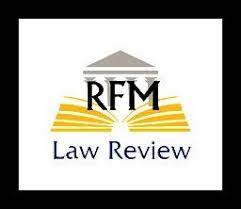About RGNUL
Rajiv Gandhi National University of Law, Patiala was established in 2006 by the Punjab Government (Punjab Act No. 12 of 2006) as a university dedicated to the field of Legal Education. The university is recognized by the University Grants Commission (UGC) and the Bar Council of India (BCI).
About the RGNUL Financial and Mercantile Law Review
RGNUL Financial and Mercantile Law Review (RFMLR) is a bi-annual, student-run, double-blind peer-reviewed law journal published by the Rajiv Gandhi National University of Law, Punjab. The journal was first published in the year 2014 and gives an opportunity to the legal academia, legal professionals, and law students to contribute research in the field of business and commercial laws. The journal is also indexed on SCC Online and has been ranked amongst the ten most accessed law school journals by SCC Online.
About the RFMLR Blog
The RFMLR Blog aims to provide a platform for the expression of novel ideas and analysis of contemporary issues in business and commercial laws. In addition to the RFMLR Call for Blogs (Open Theme), the Editorial Board periodically releases theme-specific Call for Blogs to advance the discourse on select areas of commercial laws. The website can be accessed here.
The Opportunity: Call for Blog
The Editorial Board invites blog submissions from legal practitioners, advisors, academics, and law students on various areas of business and commercial laws such as corporate law, mergers and acquisitions, competition, insolvency, banking and insurance, capital markets, dispute resolution and ADR, international trade, investment funds, labor, employment, taxation, intellectual property, real estate, technology, media & telecommunication, and white-collar crimes, and other contemporary issues in financial and mercantile laws.
Submission Guidelines
- The manuscripts shall be in the English language only.
- Co-authorship is limited to a maximum of two authors.
- Submissions may be in the form of articles, opinions, case comments, and short notes. Further, submissions analyzing or critiquing already existing academic research on a topic or issue are also welcome.
- Submissions shall be lucid, contemporarily relevant, and well-researched. They shall contain a novel analysis of the issue by the author(s). The Editorial Board encourages analytical submissions with concrete suggestions over descriptive submissions with generic suggestions.
- Submissions shall not be less than 1300 words and shall not exceed 1600 words (exclusive of endnotes). Longer pieces can be divided into two or three-part posts for better readability. However, each part post shall be complete in itself.
- The name and institution of the author(s) shall not be mentioned in the body of the submission.
- Authors shall refrain from referring to themselves in the first person in the manuscript. Further, while referring to case laws, authors are encouraged to use the names of the parties instead of referring to them as “petitioners”, “appellants”, “respondents”, etc.
For more guidelines, click here.
Deadline
The submission is on a rolling basis.

